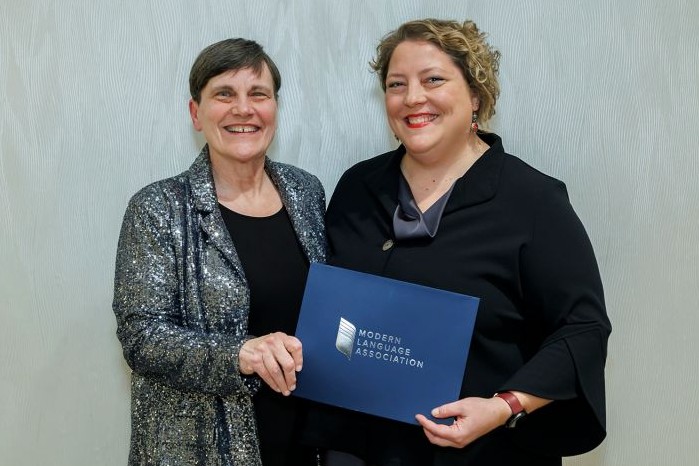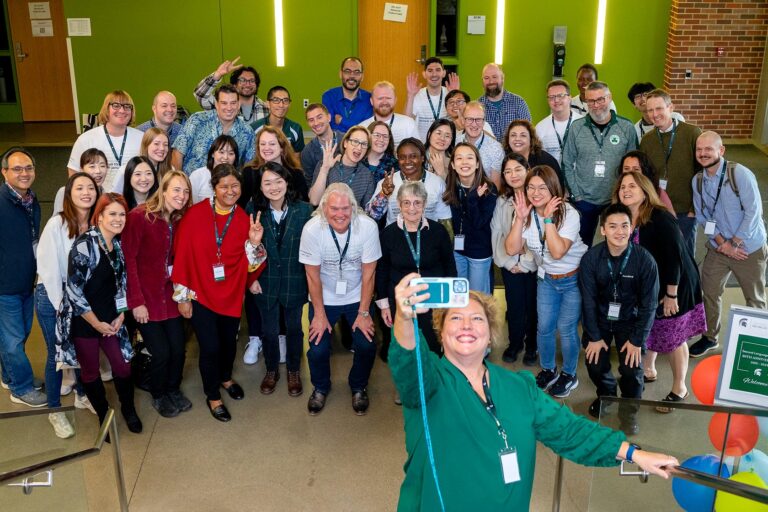Brittany Finch, a doctoral student in Second Language Studies at Michigan State University, recently was named the 2022 recipient of the Jeanne S. Chall Research Fellowship by the International Literacy Association. She received this honor for her research proposal on “The Effect of Literacy on Predictive Processing in the Brain: An Eye Tracking and EEG Study.”
“I have been working towards this project for the last three years of my Ph.D., and it was amazing to receive a fellowship that really validated the potential that I know the project has,” Finch said. “I am really excited to be able to use the fellowship money to carry out my dissertation. Receiving this fellowship was also fulfilling in that it showed that I was able to successfully communicate my research and its purpose to the relevant stakeholders. For the International Literacy Association to believe in my research enough to provide me with this fellowship has been truly incredible.”
“My dissertation will have implications for the learning opportunities that individuals with low literacy levels can take advantage of during natural language use.”
Finch’s project will examine how the development of literacy affects the brain and the prediction process. Prediction, Finch explained, is a cognitive process where “your brain anticipates upcoming words and phrases while listening or reading based on years of accumulated language experience. When we read a book, for example, and we get half-way through a sentence and have to turn the page, we usually can guess what the next few words might be.”
Researchers assumed the prediction process occurred automatically during natural language comprehension. Recent debates, however, question whether everyone predicts during natural language use or if this is a skill that develops during literary development.

Finch plans to explore the process of prediction in the brains of individuals with lower or no literacy and literate adults of different education levels. To measure prediction, Finch will use eye-tracking electrodes (EEG) to examine the eye movements and neural activity and eye movements of participants while they listen to sentences. These measurements will allow Finch to determine whether or not the individuals with no or low literacy can make predictions about upcoming words based on what they have previously heard in a sentence.
“My dissertation will have implications for the learning opportunities that individuals with low literacy levels can take advantage of during natural language use,” Finch said. “For example, individuals with low or no literacy may not learn unconsciously as much as literate individuals do due to their lack of prediction. This would be an important insight for literacy instructors as they could help fine tune their students’ prediction, possibly speeding up their road to literacy and aiding in their language learning abilities. This research can also provide directions for future studies on interventions that can help language learners make the most of the linguistic input they encounter during natural language use providing more explicit feedback for example.”
Finch plans to use the funding from the fellowship to include underrepresented populations in her future research.
“Advocacy for underrepresented populations in research and academia is one of my major goals. This includes making research itself more accessible.”
“Advocacy for underrepresented populations in research and academia is one of my major goals,” Finch said. “This includes making research itself more accessible (e.g., writing accessible summaries of research articles, publishing in open access journals, testing experimental tasks with underrepresented populations, starting conversations surrounding research ethics for underrepresented populations). This is a major goal for my current and future research agenda because I truly believe in doing research that has a real impact outside of academia.”
The fellowship also will allow Finch to maintain connections with the community, and in doing so, treat her participants as stakeholders and partners in the research.
“The work is about them, with them, and has implications for them (not just for research and academia),” Finch said.
The Jeanne S. Chall Research Fellowship is a $5,000 grant established to encourage and support promising scholars whose dissertation research addresses reading. The special emphasis of the fellowship is to support research efforts in the following areas: beginning reading (theory, research, and practice that improves the effectiveness of learning to read); readability (methods of predicting the difficulty of texts); reading difficulty (diagnosis, treatment, and prevention); stages of reading development; the relation of vocabulary to reading; and diagnosing and teaching adults with limited reading ability.
“My advisor, Dr. Aline Godfroid, sparked my interest in prediction and the seminal article that sparked all of this research for which I am truly grateful,” Finch said. “I also have to thank Dr. Kara Morgan-Short at the University of Illinois at Chicago for providing the opportunity for me to get practical EEG experience. As always, my colleagues in the SLS (Second Language Studies) program push me to do better research and connect that to useful implications. Finally, the research by Dr. Gina Kuperberg and Dr. Falk Huettig and their colleagues has made all the difference in my development as a researcher because it provided examples of really solid research methodology and design and helped me get started on this journey.”
Also receiving an International Literacy Association Award is Tanya S. Wright, Associate Professor of Language and Literacy in the College of Education, who is the 2022 recipient of the Jerry Johns Outstanding Techer Educator in Reading Award, which annually recognizes a teacher in higher education who exemplifies outstanding teaching of reading methods and who is an innovative leader, mentor, and scholar with the field of literacy education.


